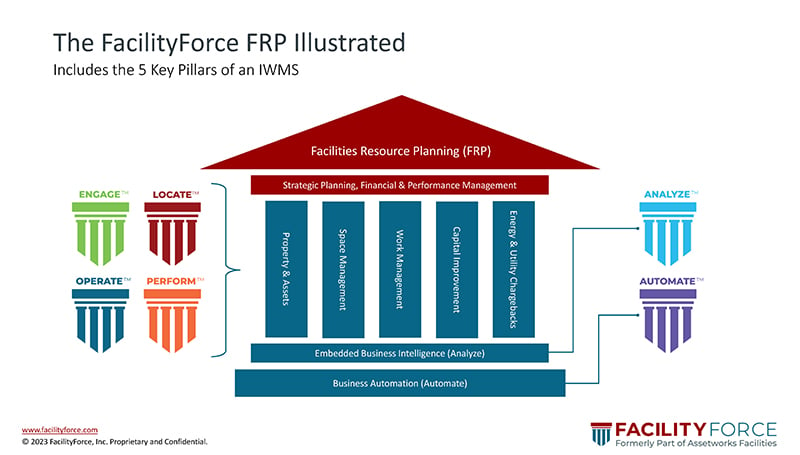Are you comparing an IWMS to a EAM system - the two of the most common facility management software systems out there? You're not alone. Many Facility Managers are asking what's the difference. We've broken down the benefits, functionality, and how to choose which is right for your organization below.
Table of Contents
Enterprise Asset Management (EAM)
Enterprise Asset Management software (EAM) is a type of asset management software system that helps organizations manage and maintain their physical assets. These assets can include equipment, machinery, vehicles, buildings, and other types of assets that are critical to the organization's operations.
EAM software provides a central repository for asset data, including maintenance schedules, work orders, inventory levels, and asset performance history. This data can be used to track the lifecycle of an asset, schedule preventive maintenance and repairs, optimize asset performance, and make informed decisions about asset investments and retirements.
EAM software typically includes features such as asset tracking, work order management, preventive maintenance scheduling, inventory management, and reporting and analytics.
Some EAM software may also integrate with other enterprise systems, such as financial and procurement systems, to provide a more comprehensive view of asset management and to enable more efficient and effective decision-making.
EAM Benefits
There are several benefits of using Enterprise Asset Management software (EAM) for organizations. Here are some of the key advantages:
- Improved Asset Performance: EAM software provides real-time data on the condition, performance, and maintenance needs of an organization's assets. This helps organizations identify potential issues early, perform proactive maintenance, and optimize asset performance, leading to improved asset uptime and longevity.
- Increased Efficiency: EAM software enables organizations to streamline their maintenance processes, automate manual tasks, and reduce paperwork. This can help improve the efficiency of maintenance operations, reduce downtime, and increase productivity.
- Better Cost Control: By tracking asset performance and maintenance activities, EAM software can help organizations identify cost-saving opportunities, optimize maintenance schedules, and extend the life of their assets. This can help reduce maintenance costs, minimize downtime, and improve overall financial performance.
- Regulatory Compliance: EAM software can help organizations ensure compliance with regulatory requirements and industry standards by tracking and reporting on asset performance and maintenance activities.
- Improved Decision-Making: EAM software provides real-time data and analytics, enabling organizations to make informed decisions about asset investments, retirements, and replacement. This can help organizations maximize the value of their assets and improve overall business performance.

Read More: Enterprise Asset Management Software (EAM) Right for My Organization?
Integrated Workplace Management System (IWMS)
An Integrated Workplace Management System (IWMS) performs a wide range of functions aimed at streamlining and optimizing facility management. It brings together various modules and data sources into a centralized platform, providing a comprehensive view of an organization's real estate and asset portfolio; which enables data-driven decision-making. Additionally, IWMS software typically integrates to other business critical applications such as HR, Purchasing, or Finance.
IWMS software provides a single platform that integrates five core functional areas for Facility Management. Those 5 areas are:

IWMS Benefits
An IWMS is a powerful tool that can significantly improve the efficiency, cost-effectiveness, and sustainability of managing workplaces and facilities, ultimately contributing to an organization's overall success all within a single software system.
IWMS & ERP Integrations:
How to choose between a CMMS or IWMS for your organization
There is no clear cut answer on which system is better, as it depends on the specific needs and objectives of the organization. If a business' primary concern is managing real estate and facilities, optimizing space utilization, and supporting strategic decisions related to real estate, then an IWMS may be more suitable. On the other hand, if your organization manages and maintains a large number of physical assets such as equipment, machinery, and buildings, and does not need to manage capital projects, space management, or energy management, then an EAM system may be more suitable for your needs. It's essential to thoroughly evaluate the features and capabilities of each system and consider how they align with your organization's workflows and objectives before making a decision.
Overall, facility management software is a necessary tool for organizations to optimize their facility operations, reduce costs, enhance productivity, comply with regulations, and make data-driven decisions for long-term success and sustainability. It is important to select the right one whether it be an EAM, IWMS, or any other of the systems out there.
"While an EAM system can meet the needs of some organizations, it is not as comprehensive as an IWMS. A truly integrated facilities management software solution (such as an IWMS or FRP) breaks down silos by providing a single platform for your facility management software needs. With a truly integrated system, silos are broken down as a single system is responsible for your daily facility management operations."
Would you like to learn more?
Related Resources:
- Facilities Management Overview
- What is the Best IWMS Software for Government?
- The State of Alaska Tackles Statewide Deferred Maintenance
- Why Capital Budgeting Software is Critical in Government Facilities
- Three Keys to Effective Space Management
- Facilities System Integration
- FacilityForce's IWMS Solution




